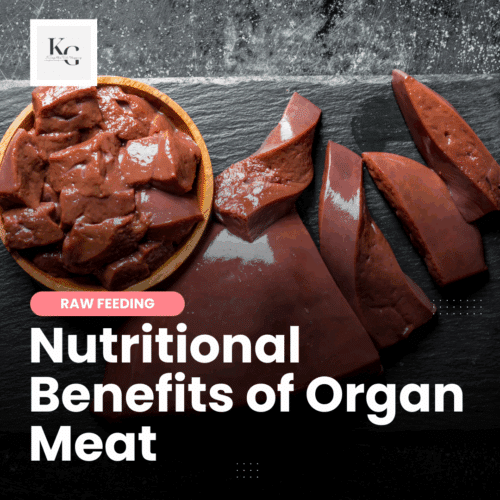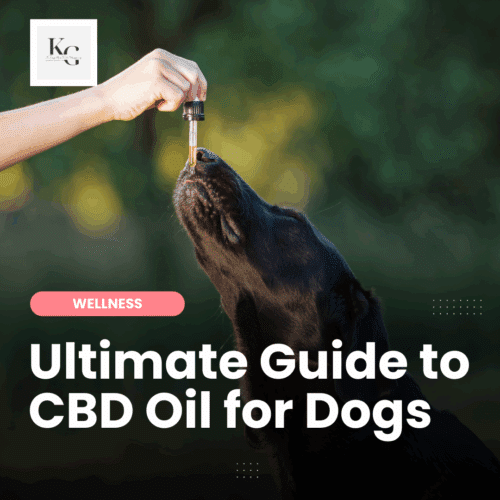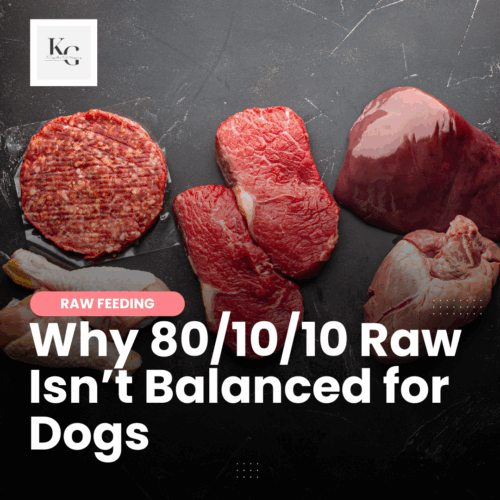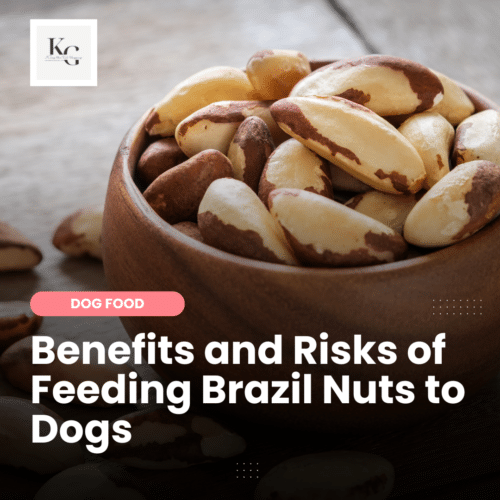Keep the Tail Wagging is supported by pet parents. I occasionally earn a commission (at no additional cost to you) when you click through an affiliate link to one of my favorite products. Thank you for your support. Read More
I found an article on Facebook groups about Oprah and raw feeding. People were upset because Oprah was tellin people that raw feeding prevents cancer. However, no one had bothered to read the article – they were triggered by the title: 7 Reasons Why Oprah Feeds Her Dog a Raw Food Diet.
The above image is featured in the article, listing all the benefits of raw feeding, one of which is “Cancer Free; cancer no longer becomes a concern.”
I have two issues with this article:
- This blog post promotes misinformation; raw feeding may reduce cancer risk but doesn't prevent cancer.
- The title makes people believe that Oprah Winfrey has approved this image and contributed to this article.
Although I'd love it if the cure to cancer were a fresh food diet, we're seeing raw fed dogs diagnosed right alongside their kibble-fed brethren. So, I'd like to explain why raw feeding doesn't prevent cancer so that you're not caught off-guard should you receive a cancer diagnosis from your veterinarian.
7 Reasons Why Raw Feeding Doesn't Prevent Cancer
1 – We're Still Learning About Raw Feeding
Although raw feeding predates kibble, today's pet parents are still learning. With the growing number of canine nutritionists available to help us formulate a diet, no one has created a diet guaranteed to prevent cancer. Sourcing ingredients is important, and although we try to look for pasture-raised, antibiotic-free, non-gmo, organic ingredients, this isn't easy for everyone. And we're learning about cancer-fighting foods, but it's not always clear how many of these foods our dogs need to be effective against cancer cells.
2 – Some Breeds are Predisposed to Cancer
Sadly, some dogs are predisposed to cancer. According to DogCancerBlog.com, “the Golden Retriever is the breed most prone to cancer. It is estimated that up to 75% of Goldens will contract cancer during their lifetimes.” Other breeds mentioned include Boxers, Great Danes, Rottweilers, Scottish and West Highland Terriers, and Shetland Sheepdogs.
3 – Cancer Needs to be Bred Out of Our Dogs
Cancer and other health issues are in many breed lines, and several breeders have explained that it will take several generations of responsible breeding before historical health issues begin to disappear. If we have a dog that comes from a line that has seen cancer, feeding that dog a raw food diet will give them a better shot at surviving a cancer diagnosis, in my opinion, but there are no guarantees.
If you're looking for reputable, natural-rearing breeders, visit the Natural Rearing Directory.
4 – Increased Exposure to Toxins
For decades, dogs have been subjected to over-vaccination, chemical flea and tick repellents, and heartworm-preventative treatments. Add this to the toxins our dogs are exposed to in and outside our homes – weed killers, exhaust fumes, mosquito repellents, flea bombs, cleaners, and air fresheners. Long-term exposure to any of these things may contribute to cancer.
And the meat we source for our dogs' diet may have been exposed to pesticides, antibiotics, steroids, and hormones – which may impact our dogs' health.
5 – Early Spay and Neuter
With the shockingly high number of homeless pets, we're seeing rescue groups and veterinarians opt for early spay and neutering to prevent unwanted litters. While I completely understand why some rescues have chosen this route, some believe these dogs may face health issues later in life, including cancer.
This is a confusing topic as some scientists tell us dogs have a lower risk of certain cancers when spayed or neutered, while other scientists point to an increased risk of cancer.
6 – We Don't Always Know a Dog's History
Those who adopt dogs through rescue groups are left in the dark about a dog's background and heritage. We've adopted many dogs over the years and only met the parents of a littermate pair we brought home from Idaho. But we didn't stay in touch with the family and don't know if either of the parents developed any health issues later in life.
Although familial history doesn't guarantee that a dog will or won't develop cancer, learning about the health changes of a parent or littermate may help us circumvent a cancer diagnosis in our dogs.
7 – Raw is Just the Beginning
When it comes to keeping our dogs healthy, feeding them a biologically appropriate diet is just the beginning. There are a lot of changes I've had to make in how I raise my dogs to help them live long, healthy lives.
- Transition to a balanced raw food diet, sourcing for quality brands, farms, and other suppliers
- Swap flea and tick repellents for garlic (yes, it's safe for dogs), essential oils, or natural repellents.
- Find a healthy alternative to heartworm prevention and treatment.
- Practice a conservative vaccination protocol and conduct liver detox to strengthen the liver.
- Find natural alternatives to weed killers, bug repellents, room fresheners, cleansers, and detergents.
Learning to Feed a Balanced Raw Diet
I would love it if feeding raw meant I no longer had to worry about cancer or other illnesses. However, for many of us, it's not that simple.
I agree that raw gives our dogs a better shot of dodging or surviving cancer because raw promotes a healthier, stronger immune system. I take it a step further and focus on my dogs' gut health; I give them CBD oil daily and add turkey tail mushroom tincture to their meals – but this may not be enough for every dog.
I believe that the best thing we can do to give our dogs a better chance of living a longer, healthier life is to…
- continue to learn about canine nutrition,
- do what we can to reduce toxins in our dogs' environment,
- and schedule annual or bi-annual wellness checks with our veterinarian.
I pray that everything I'm doing today will mean that my dogs will be with me 10-15 years from now. My dogs mean the world to me, and I know I'm not alone.


















Thank you for your thoughts. Would you mind sharing support for your supposition that female dogs need to be spayed prior to their first heat and the 99.9% lowered cancer rate? Thanks.
Here is something that I saw last year that really made me rethink spay and neutering for dogs: https://www.facebook.com/doctor.karen.becker/videos/10155535042277748/
Sorry but you’re very wrong about early spaying. Female dogs must be spayed before their first heat in order to ensure a 99.999% chance of eliminating mammary cancer. Every heat adds an additional 10-20% increase in getting mammary cancer which is the #1 cancer killer in female dogs. Always spay and neuter by month 8 in your dog’s life and not before 6 months for optimal health. Neutering can be done later – anytime during the first year is fine for neutering males.
i’m with you – let’s band together – continue to share and do our best to educate all we can do to reduce the risks but we cannot promote false hope, remedies and mis information to our readers.